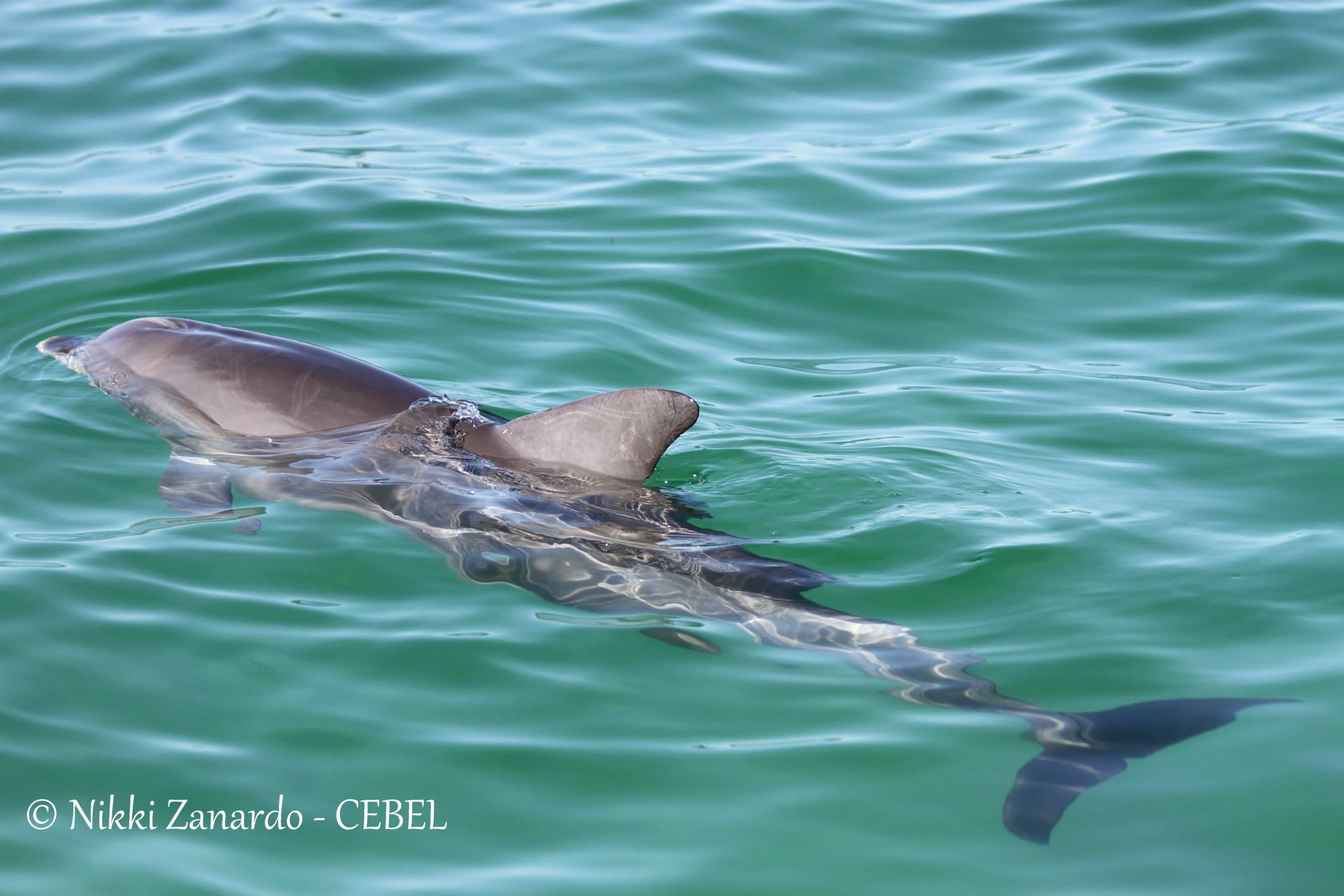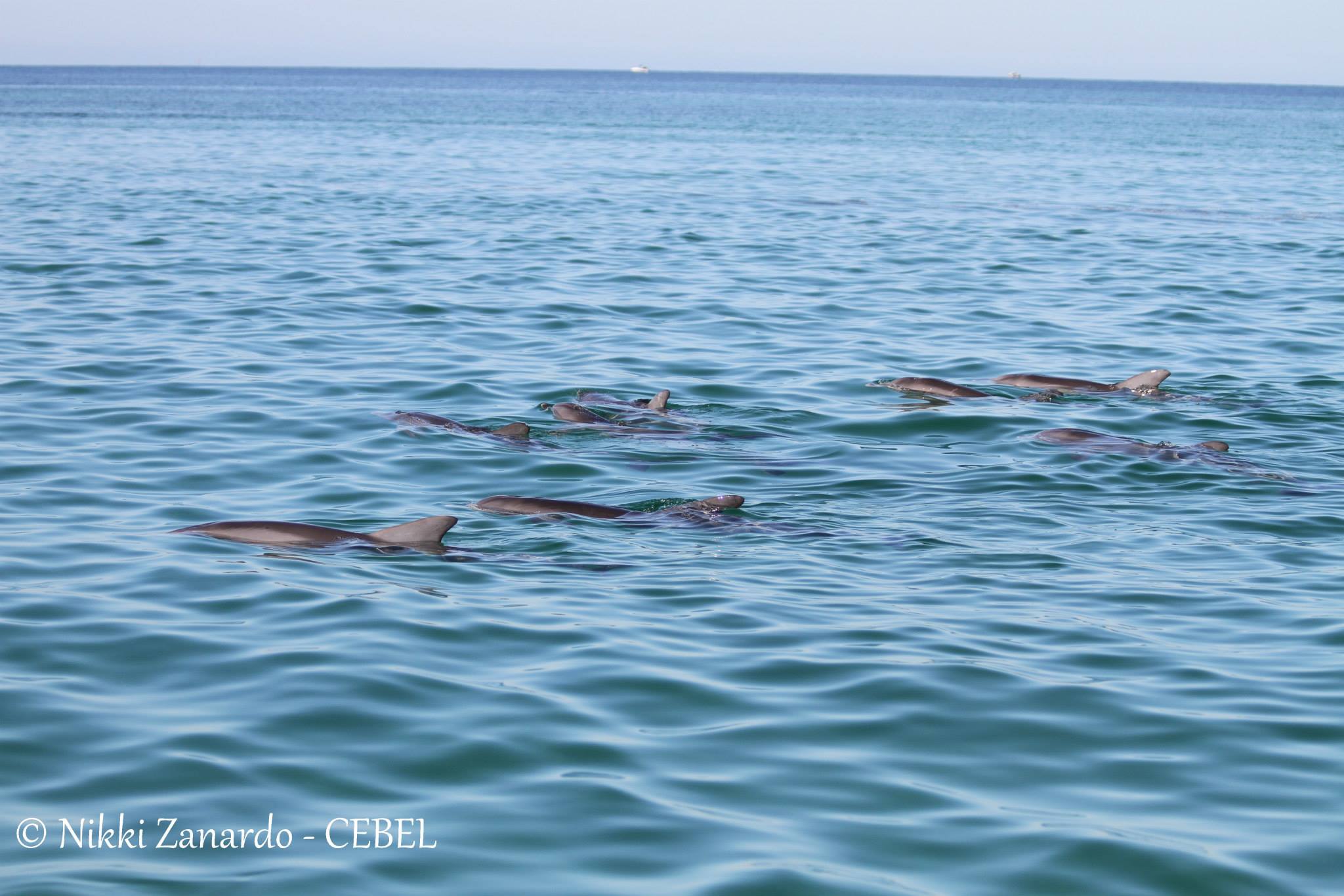Research Engagement and ImpactDifferent environments, different DNA, different dolphins?
Can DNA sequencing of three bottlenose dolphin species (genus Tursiops) show a difference in the structure underlying the changes that have been observed from the same genus in different environments? The bottlenose dolphin is the most common dolphin in the world and lives in all oceans, apart from the Arctic and Antarctic oceans.
If the DNA sequencing does show that there are genomic changes then this will go a long way in improving our understanding of dolphins and the ways that they adapt to their environments. This will then allow scientists to make predictions about how dolphins will react to ongoing climate change, and other human-induced disturbances to their habitats.
Flinders’ PhD student Eleanor Pratt, College of Science and Engineering, will be comparing DNA from bottlenose dolphins living in coastal areas to those that prefer deeper offshore waters to identify the sections of DNA that may underlie differences between coastal and offshore ecotypes in the southern hemisphere. This includes differences in the structure of the skull, as well as in the number of vertebrae, relative body size, and diet. Eleanor will then describe the genetic population structure of two bottlenose dolphin species inhabiting coastal waters of southern and south-eastern Australia. This will establish the level of gene flow occurring between these populations and identify the DNA regions that may be associated with the potential adaptation of these dolphins to different salinity regimes, depths, water temperatures, habitat types and other environmental features.
Eleanor’s project aims to provide novel information about how bottlenose dolphins are able to adapt to their habitats. With greater knowledge of the population structure and adaptive capacity of these dolphins more effective conservation strategies can be implemented to prevent population declines in the face of ongoing environmental disturbances. “The contribution from Sir Mark Mitchell Research Foundation will go toward funding next-generation DNA sequencing of bottlenose dolphin samples, allowing me to obtain high-quality, high-coverage DNA sequences for analysis. This grant means that I am able to sequence a large number of individuals, expanding the geographical coverage of my study and improving the reliability of the results that I get,” Eleanor said.
Images of bottlenose dolphins (Tursiops australis) from Gulf St. Vincent provided by Nikki Zanardo, Flinders Cetacean Ecology, Behaviour and Evolution Lab (CEBEL).
More posts in "Research Engagement and Impact" series:
- (13 Dec 2018) ECR Spotlight - Dr Ben Lewis
- (29 Nov 2018) Impact Seed Funding – supporting our Flinders ECRs – Dr David Smith
- (29 Nov 2018) Research Roundup - 29 November 2018
- (15 Nov 2018) Impact Seed Funding – supporting our Flinders ECRs – Dr Lua Perimal-Lewis
- (14 Nov 2018) Research Roundup - 15 November 2018
- (01 Nov 2018) Flinders research from an undergraduate class to a record breaking swim attempt
- (01 Nov 2018) Research Roundup - 1 November 2018
- (31 Oct 2018) ECR Spotlight - Dr Bev Rogers
- (31 Oct 2018) Flinders researchers trip to Germany on bringing science to market
- (18 Oct 2018) Melbourne and Canberra fellowships advance research and leadership skills for Flinders researcher
- (18 Oct 2018) Impact Seed Funding – supporting our Flinders ECRs - Dr Linlin Ma
- (18 Oct 2018) Research Roundup - 18 October 2018
- (04 Oct 2018) How can Australian innovation create new industries and jobs?
- (04 Oct 2018) Research Roundup - 4 October 2018
- (27 Sep 2018) Saving Nemo at Ngeringa Winery
- (20 Sep 2018) Assisting the UN and developing nations on how to measure wellbeing
- (20 Sep 2018) Equity Hub to assist translating research into change
- (06 Sep 2018) Steps to improve gender diversity in coastal geoscience and engineering
- (23 Aug 2018) Finding the invisible traces
- (09 Aug 2018) Diving in Deep to strengthen links with UNESCO members
- (09 Aug 2018) Impact Seed Funding – supporting our Flinders ECRs
- (09 Aug 2018) Older Adults engaging for a better quality of life
- (08 Aug 2018) The scientist’s guide to a successful career in academia
- (27 Jul 2018) Flinders aiming to lead the blueeconomy
- (27 Jul 2018) Can you have a conversation with a computer?
- (12 Jul 2018) Flinders linking with arts and culture to explore their real value
- (12 Jul 2018) WHO internship for Flinders researcher
- (28 Jun 2018) Flinders linkage grants success
- (28 Jun 2018) Flinders’ led project top in Radiation Research
- (18 Jun 2018) Nothing going to waste - Flinders NIH Success
- (18 Jun 2018) ECR Spotlight - In Conversation with Dr Sam Elliott
- (29 May 2018) Flinders leading the reviews to improve remote health
- (17 May 2018) Generating conversation through The Conversation
- (15 May 2018) ECR Spotlight - Dr Ashok Manoharan 2018
- (03 May 2018) Flinders’ Archaeologist off to Cambridge for a year
- (26 Mar 2018) New chapter of Indigenous history told through food
- (08 Mar 2018) Flinders linking with Indigenous groups to explore aspects of colonial Australia
- (22 Feb 2018) ECR Spotlight - Ian Moffat
- (21 Feb 2018) Flinders working to Beat Cancer
- (25 Jan 2018) Why are little penguins declining?
- (25 Jan 2018) Scimex - Register now to be a part of breaking news
- (24 Jan 2018) ECR Spotlight - Alice Clement
- (21 Dec 2017) A Flinders first - automated launch and recovery for autonomous underwater vessels
- (13 Dec 2017) 2017 Vice-Chancellor's Award for Early Career Researchers
- (11 Dec 2017) ECR Spotlight - Vishnu KK Nair
- (06 Dec 2017) NHMRC success for Flinders
- (24 Nov 2017) Aiming to improve the health, education and wellbeing of children
- (17 Nov 2017) Accelerating the Interplay Wellbeing Framework
- (16 Nov 2017) 2018 Visiting International Research Fellows to Flinders
- (15 Nov 2017) ECR Spotlight - Ashokkumar Manoharan
- (15 Nov 2017) 2018 Flinders Endeavour Scholars and Fellows announced
- (14 Nov 2017) Time to Bragg about science writing
- (10 Nov 2017) Flinders Forensic Science cleans up at Awards
- (10 Nov 2017) Flinders successes in the recent ARC grant round
- (30 Oct 2017) Students Present Around the World
- (20 Oct 2017) Over $8 Million to Flinders from the National Palliative Care round
- (19 Oct 2017) ECR Spotlight - Sam Schultz
- (17 Oct 2017) Flinders' Fresh Scientists in the Pub
- (11 Oct 2017) Indigenous knowledge, not just for Indigenous communities
- (06 Oct 2017) Leading Drug and Alcohol researchers at Flinders’ NCETA secure $1.7 million in funding
- (05 Oct 2017) ECR Spotlight - Margaret Shanafield
- (28 Sep 2017) Our Distinguished Geographer
- (07 Sep 2017) ECR Spotlight - George Karpetis
- (01 Sep 2017) Eureka! Prize for blood test for bowel cancer recurrence
- (22 Aug 2017) Different environments, different DNA, different dolphins?
- (17 Aug 2017) ECR Spotlight - Dr Harriet Whiley
- (03 Aug 2017) ECR Spotlight - Giselle Rampersad
- (17 Jul 2017) Time to Scope your research - FAST
- (17 Jul 2017) Time to Scope your research - Hoverflies
- (13 Jul 2017) Tips from a first time interviewee
- (12 Jul 2017) Saving Nemo at the Star of Greece
- (07 Jul 2017) Invasion of the European crabs
- (20 Jun 2017) Fossil finds bring Australia's evolutionary history to life
- (07 Jun 2017) Peer Prize up for grabs
- (02 Jun 2017) Tracking the marine ecosystems in South Australia
- (29 May 2017) Be Your Best for Impact
- (18 May 2017) Aiming to catch criminals as never before
- (05 May 2017) Excavating with and in a Community
- (29 Apr 2017) What does engagement look like? Community-initiated research.
- (24 Apr 2017) Planning for one of the world’s youngest nations
- (07 Apr 2017) Pitching ON tasty seaweed jelly
- (29 Mar 2017) Best and Brightest for Hearts
- (27 Mar 2017) The Best Student Publications - Flinders 2016 edition
- (16 Mar 2017) From workshop to book - Underwater archaeology and 3D
- (21 Dec 2016) Recent Funding Success
- (21 Dec 2016) Research Impact - Point of Care Testing
- (21 Dec 2016) New ARC College of Experts
- (20 Dec 2016) Flinders Celebrates - 2016 Research Successes
- (19 Dec 2016) Vice-Chancellor Awards for Research Excellence
- (19 Dec 2016) Cardiology, Mental Health Projects among NHMRC Grant Success




Comments
Comment preview